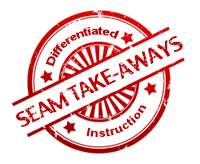
The true purpose of an education is to discover how we learn best so that we may continue doing so throughout life. Because of our busy lives and the many extra tasks thrown at us, we as teachers often feel we have to give away the facts instead of having the students earn them. When we struggle yet overcome the obstacle, we become stronger.
The same is true for learning. If we have to think a bit harder and deeper and arrive at the answer, we have earned that knowledge. Our strategies emphasize this simple concept: The student is responsible for the learning and the teacher is the guide to help them discover how to do it. We can never learn for our kids, nor should we, but we can most certainly help them learn to work under pressure and discover how they can truly perform above and beyond our expectations.
We will show you how to do this!
Differentiated Instruction Benefits for Teachers
- Teachers “buy-in” because this is not a training full of fads and buzzwords. Teachers are not asked to hear more “theory” and then figure implementation out on their own.
- Teachers are always looking for ways to improve their craft and Differentiated Instruction does just that by giving strategies that can be modified for all kids and communities – for all grades levels and curriculum.
- Differentiated Instruction is an effective way to reach all students in the classroom and the stress of meeting the high expectations for all students is alleviated. Educator’s energy can be poured into the students they work with.
- Differentiated Instruction brings attention and engagement to each and every lesson. Students are actively involved in the content and excited about the learning they are undertaking
- Differentiated Instruction strategies promote having a strong understanding of the students that we teach. Understanding our students in their learning styles on the deep level allow for accurate assessing the learning as well as strong relationships between student and teacher.
- Differentiated Instruction fosters reflective practice in our lessons, which is an essential aspect of most evaluation systems.

